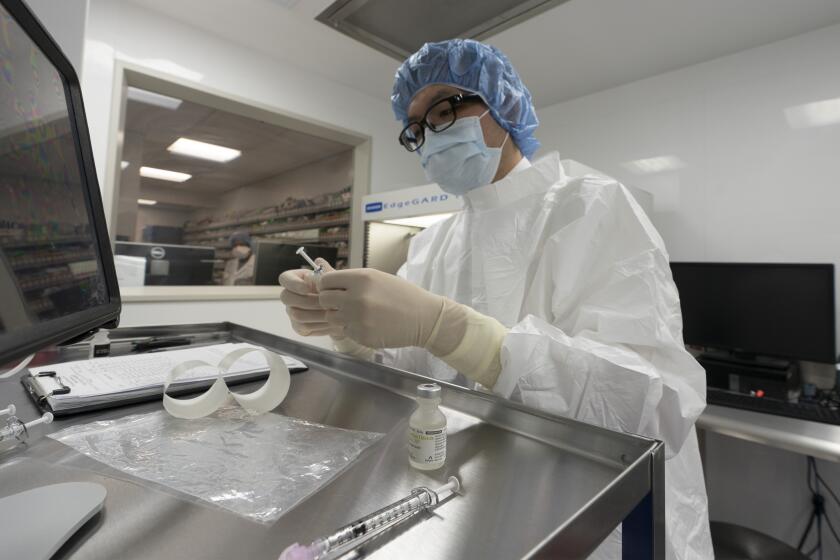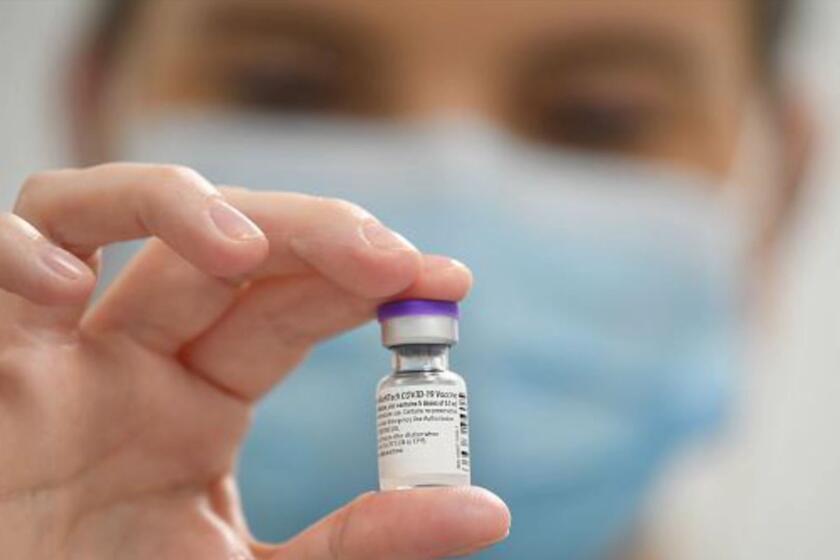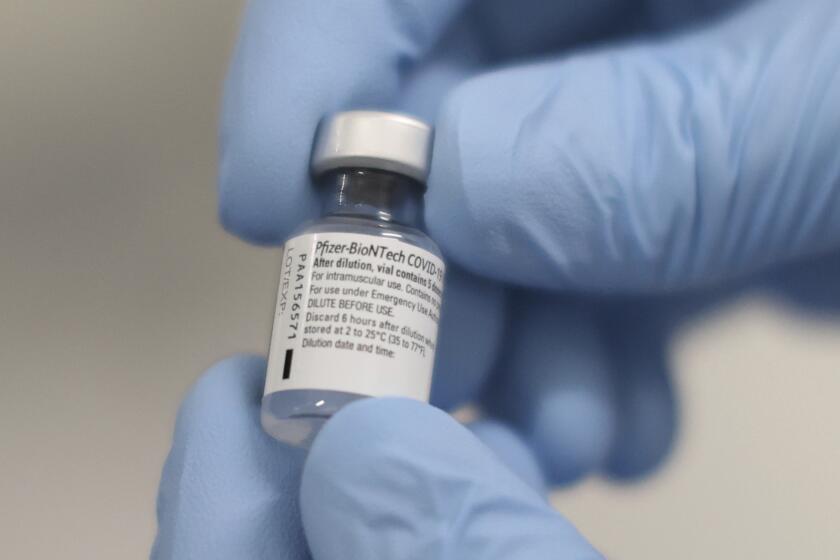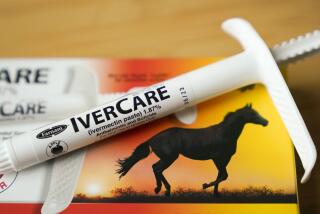The FDA didn’t ‘approve’ Pfizer’s COVID-19 vaccine. Here’s why
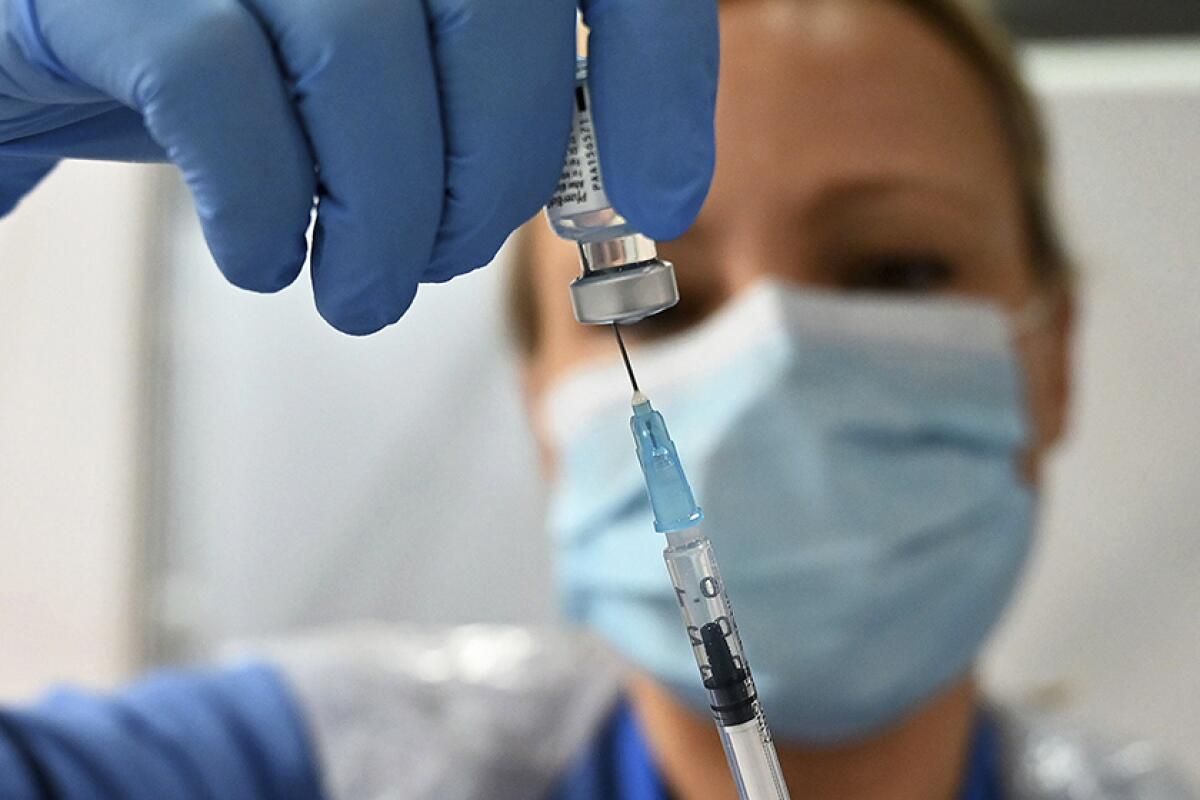
- Share via
A lot of things are different when you’re in the midst of a global pandemic. A case in point: How federal regulators scrutinize and authorize new vaccines.
The U.S. Food and Drug Administration ushered in a new phase of the fight against COVID-19 on Friday by giving its blessing to a vaccine made by Pfizer Inc. and BioNTech. It’s the first such vaccine to get a green light from the FDA, and immunizations will begin in a matter of days.
There are plenty of reasons why it passed muster. Clinical trial data indicate that:
• It was 95% effective at preventing cases of COVID-19 in both Latinos and non-Latinos.
• It was 100% effective in Black people.
• It was 94% effective in people who were at least 56 years old. (The older you get, the greater the risk of a serious case of COVID-19.)
• It was 95% effective in those who had at least one medical condition that made them more likely to develop a serious case of COVID-19.
• It was 96% effective for people who were obese, another condition that makes people more vulnerable to COVID-19.
Yet none of this was enough for the vaccine to win official FDA approval. What it got instead was a more limited emergency use authorization.
Why?
Blame it on the pandemic.
The FDA has authorized emergency use of a COVID-19 vaccine developed in record time by Pfizer Inc. and BioNTech. Shots will begin within days.
During a public health emergency, it’s imperative to develop new medicines and vaccines as quickly as possible. But even when speed is of the essence, the FDA still takes the time to be sure patients aren’t subjected to untested therapies that do more harm than good.
So the agency uses an alternative evaluation process that’s designed to vet things more quickly than the usual FDA approval regimen. If a drug or vaccine passes muster, it’s granted an emergency use authorization, or EUA.
An EUA can be used on a brand-new medical product or on an existing one that has already been approved for another purpose. They’re not limited to vaccines — under the right circumstances, an EUA can be granted to anything used to “diagnose, treat, or prevent serious or life-threatening diseases or conditions,” the FDA explains.
What are those conditions?
For starters, the country needs to be in an official, specific kind of public health emergency. Secretary of Health and Human Services Alex Azar declared that the coronavirus triggered a nationwide public health emergency that began on Jan. 27, but that declaration doesn’t count because it was issued under the Public Health Service Act.
The legislation that matters is the Federal Food, Drug and Cosmetic Act, a law passed in 1938 that empowered the FDA to regulate medications, among other things. Azar issued a public health emergency under this law that was effective as of Feb. 4.
When people talk about COVID-19 vaccines, they can sound like they’re speaking a foreign language. Don’t worry! Here’s your guide to vaccine vocabulary.
Another important condition for issuing an EUA is that “there are no adequate, approved, and available alternatives” to the product being authorized. That’s certainly the case with vaccines against COVID-19, a disease that only came on the scene at the end of 2019.
An experimental vaccine being considered for emergency use authorization still must be tested in multiple rounds of clinical trials. In Phase 1, the candidate vaccine is given to a small number of healthy people at gradually increasing doses to make sure it’s safe and well-tolerated. A Phase 1 trial might provide some preliminary information about ideal dosages as well.
Next comes a Phase 2 study, which involves more volunteers testing various doses. At this point, the study will branch out to include people with a variety of health conditions, not just those who are in great shape. This is also when a vaccine is first compared head-to-head against a placebo.
If no safety issues crop up, things proceed to Phase 3. Thousands of study volunteers from a variety of backgrounds are randomly assigned to receive either the vaccine or the placebo. This type of study helps researchers measure the effect of the vaccine. For instance, in Phase 3 trials of the Pfizer-BioNTech vaccine, eight of the 17,411 people who were given the vaccine wound up becoming sick with COVID-19, compared with 162 of the 17,511 who got the placebo. Using that and other data, researchers determined that the vaccine was 95% effective at preventing COVID-19.
To be considered for an EAU, a Phase 3 vaccine trial should include “well over 3,000” participants, and at least half of them should be tracked for at least two months after receiving their final dose.
An influential panel of independent scientists advised the Food and Drug Administration to authorize the COVID-19 vaccine developed by Pfizer Inc. and BioNTech.
Once sufficient data are in hand, the FDA can decide whether emergency use authorization is warranted. Doctors and scientists on the agency’s staff pore over the study results. So do the independent scientists and health experts on the agency’s Vaccines and Related Biological Products Advisory Committee.
In the case of a vaccine, authorization can be granted if “the known and potential benefits outweigh the known and potential risks,” the FDA says.
The agency also assesses the company’s ability to consistently produce high-quality doses of its vaccine.
Granting emergency use authorization isn’t the end of the story. Once an authorized vaccine goes out to the public, its manufacturer must keep track of any serious side effects that befall those who take it, especially adverse events that result in hospitalization or even death.
The FDA, the Centers for Disease Control and Prevention and other government agencies will do their own safety monitoring as well. If the FDA ever determines that the benefits of the vaccine no longer outweigh the harms, the emergency use authorization can be revoked.
An EUA can last only as long as a public health emergency is in effect. But scientists anticipate that the coronavirus will continue to circulate in humans even after the COVID-19 pandemic ends. In that case, vaccine makers that want to keep their products on the market will need to have regular FDA approval — and to get it, they’ll need to keep their Phase 3 clinical trials going.
And that’s probably what they’ll do. The FDA said it expects vaccine makers who receive emergency use authorizations to “continue to collect placebo-controlled data in any ongoing trials for as long as feasible” so they can apply for regular approval.
